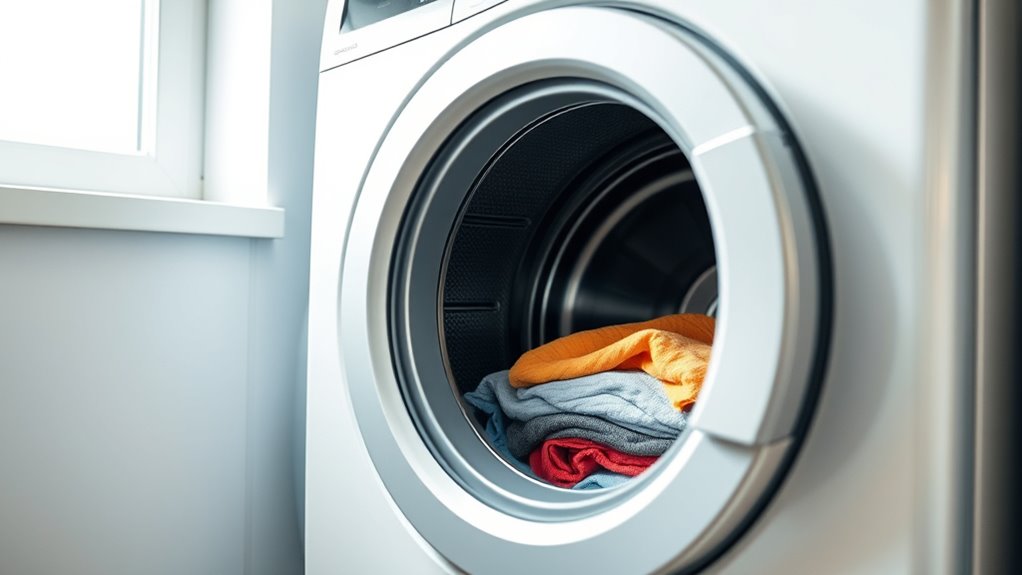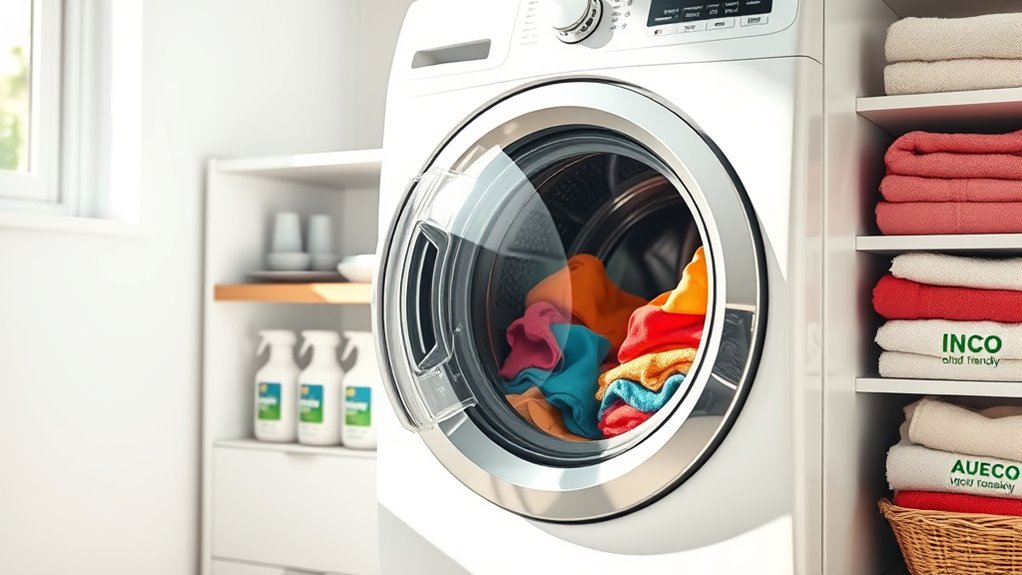Using cold water for laundry is a simple way to save energy and protect your clothes. It reduces the need to heat water, lowering your utility bills and the environmental impact. Modern cold water detergents work effectively on stains and fabric care, helping your clothes last longer. By following best practices like checking labels and pre-treating stains, you can maximize results. Keep going to discover more easy tips for eco-friendly laundry routines.
Key Takeaways
- Using cold water reduces energy consumption by eliminating the need to heat water during laundry.
- Modern cold water detergents are effective at cleaning clothes, ensuring stain removal without hot water.
- Always check clothing care labels to confirm cold water is suitable, preventing damage and color fading.
- Proper machine settings and avoiding overloading enhance cleaning efficiency and energy savings.
- Combining cold water with enzyme-based detergents extends garment lifespan and lowers utility bills.

Have you ever wondered how to keep your laundry looking fresh and stain-free? One simple yet effective way is to switch to cold water washing. Not only does this save energy, but it also benefits your clothes by maintaining their color and fabric integrity. Understanding how cold water impacts detergent efficiency and fabric care can help you achieve cleaner, longer-lasting laundry without sacrificing quality. When you opt for cold water, you considerably reduce the energy used by your washing machine, since heating water accounts for a large portion of household energy consumption. This small change can lead to noticeable savings on your utility bills and reduce your carbon footprint. But many worry that cold water won’t clean effectively or that stains won’t come out. The good news is that modern detergents are specially formulated to work well in cold water, boosting detergent efficiency even at lower temperatures. Look for detergents labeled for cold water use, as they contain enzymes and surfactants designed to break down dirt and stains without the need for hot water. These enzymes are particularly adept at dissolving protein-based stains like blood, sweat, and food, which are often more stubborn in cold water. Using the right detergent ensures you’re not sacrificing cleaning power, and it also helps preserve the fabric care of your clothes. Cold water washing is gentler on fabrics, reducing wear and tear that can happen with hot water. It prevents shrinking, fading, and weakening of fibers, extending the lifespan of your wardrobe. This is especially important for delicate garments or items with vibrant colors. Proper fabric care in cold water means you can wash your clothes more frequently without worrying about damage, keeping your wardrobe looking newer longer. To maximize these benefits, always check the care labels on your clothing and choose the appropriate water temperature. Pre-treating stains with a stain remover before washing can further improve results, especially in cold water. Additionally, don’t overload your washing machine—crowding hampers detergent efficiency and fabric care by preventing clothes from rinsing properly. Use the correct amount of detergent; too much can leave residue, and too little may not clean thoroughly. Finally, consider running an occasional hot water cycle for heavily soiled items or bedding, but for everyday laundry, cold water washing is an effective, eco-friendly choice. By making these adjustments, you’ll enjoy cleaner clothes, better fabric care, and energy savings—all while doing your part to protect the environment. Incorporating proper machine settings can further optimize your laundry results and energy efficiency.
Frequently Asked Questions
Does Cold Water Washing Kill Germs Effectively?
Cold water washing can effectively kill germs and remove bacteria if you use the right laundry detergents. Modern detergents are formulated to target bacteria at lower temperatures, ensuring proper germ elimination. While hot water is more traditional for bacteria removal, cold water combined with effective detergents can still do a good job. Just make sure to wash your clothes thoroughly and select products designed for cold water sanitation.
Can Cold Water Remove Tough Stains Better Than Hot Water?
Imagine a stubborn stain stubbornly clinging to your fabric. Cold water can be surprisingly effective for stain removal, especially with the right detergent. While hot water might seem more powerful, it can sometimes damage delicate fabrics. Cold water helps preserve fabric safety, preventing shrinking or colors fading. For tough stains, pre-treat and use specialized stain removers, then wash in cold water for safe, effective cleaning without compromising your clothes.
Are There Clothes That Shouldn’t Be Washed in Cold Water?
Some clothes shouldn’t be washed in cold water, especially those made from fabric sensitivity or prone to color bleeding. Delicate fabrics like silk or wool may need warm or cold water, but check labels first. Bright or dark colors might bleed in cold water, so it’s better to wash them separately. Always read care labels to avoid damage or color transfer, ensuring your clothes stay in great condition.
How Does Cold Water Washing Impact Laundry Detergent Effectiveness?
Washing your clothes in cold water is like trying to melt ice with a candle; it might take longer. Cold water can affect detergent formulation because some enzymes and stain fighters work best at higher temperatures, reducing their effectiveness. Water temperature effects mean you may need to select detergents designed for cold water to guarantee your laundry gets clean without sacrificing energy savings. Always check your detergent label for cold water compatibility.
Is Cold Water Washing Suitable for All Fabric Types?
Cold water washing is suitable for most fabric types, but you should be cautious with delicate fabrics. It helps prevent fabric shrinkage and color fading, keeping your clothes looking new longer. For fragile or colorful items, cold water is ideal to maintain their integrity. However, for heavily soiled or greasy fabrics, warm water may be more effective. Always check care labels to make sure proper washing methods.
Conclusion
Think of your laundry routine as tending a garden. Just as watering wisely helps plants thrive without waste, choosing cold water preserves your clothes and conserves energy. Small, mindful choices—like sticking to cold washes—are like nurturing your garden steadily, leading to a lush, sustainable future. Every load you save energy on is a seed planted for a greener world. So, embrace these tips and watch your efforts bloom into a healthier planet.









